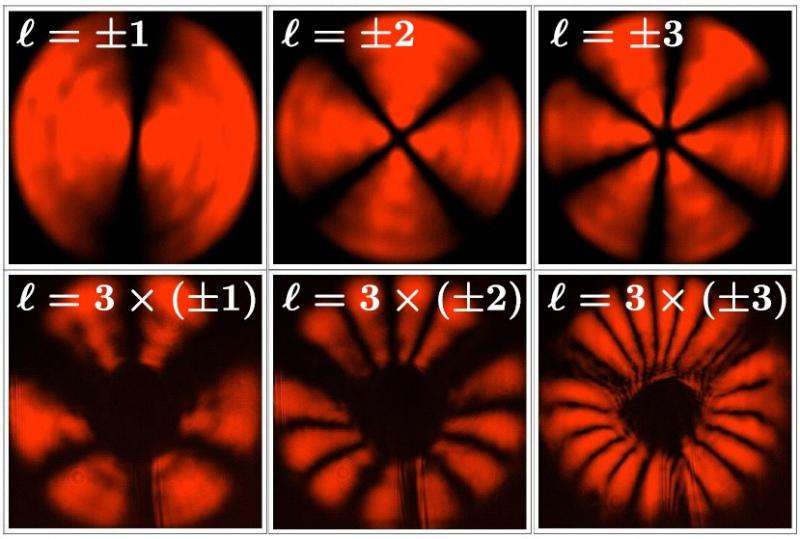When the light “petals” (quantum states with an infinite number of values representing the infinite number of hotel rooms) in the top row are multiplied by 3, the number of petals in the bottom row is tripled—analogous to “tripling infinity.” Credit: Václav Potoček, et al. ©2015 American Physical Society
(Phys.org)—It was another banner week for physics as one team at Cornell verified the 'Zeno effect,' whereby atoms won't move while observed. They conducted experiments in an Ultracold Lab and found that atoms that normally would tunnel under a given circumstance, would not if they were watched. Also another international team of researchers found a way to experimentally realize a quantum Hilbert hotel—they made two proposals, one theoretical the other experimental, both of which were based on an infinite number of quantum states.
And another team with the National Institute of Standards and Technology found a way to experimentally demonstrate a 140-year-old prediction: A gas in perpetual non-equilibrium. They created a 3-dimensional cloud that never reached thermal equilibrium. In a more practical effort, a team at Cambridge University announced that they had developed a new method for scaling up quantum devices—allowing for control of 14 quantum dots with just 19 wires. Also somewhat related, a team of researchers at Harvard announced an experiment showing that light can go infinitely fast with a new on-chip material—the first on-chip metamaterial with a refractive index of zero.
In other news, a group of geochemists at UCLA found evidence that suggests life on Earth likely started 4.1 billion years ago—much earlier than scientists thought—by studying zircons in a lab. And a trio of researchers (Jean-François Bonnefon, Azim Shariff and Iyad Rahwan) uploaded a paper to the preprint server arXiv, each looking at the ethical issues of self-driving cars. Each poses questions meant to stir policymakers into thinking about self-driving cars under ethical scenarios. Also, a team of researchers at the University of Queensland found 1500 'ageing' genes that could lead to new treatments—which they suggest might lead to new ways to treat old age-related ailments. And an international team of researchers made an unexpected discovery—a comet that contains alcohol and sugar—comet Lovejoy , which left evidence of its makeup as it swept past our field of view this past February.
And finally, if you are male and have been stressing about the impact that stress may be having on your body, you may have even more to worry about as a team at the University of Pennsylvania found that stressed dads affect offspring brain development through sperm microRNA.
Journal information: arXiv
© 2015 Phys.org
























